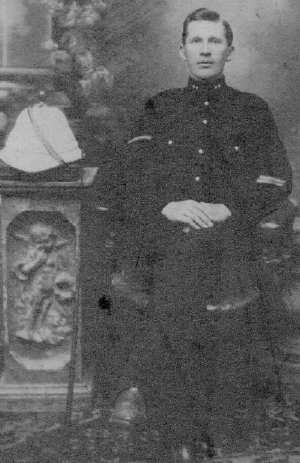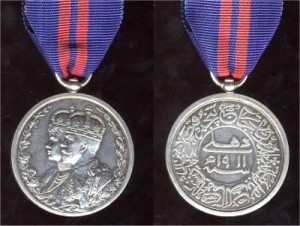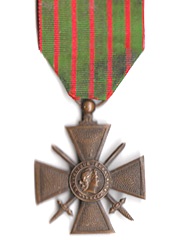2nd Lieutenant Albert Edward Underwood
(Croix de Guerre, Delhi Durbar Medal)
Regular Army Reserve of Officers, No 8 Reserve, Royal Horse Artillery
19th Battery Royal Field Artillery (48989 Corporal promoted 2nd Lt)
7849 Private Leicestershire Regiment
 Albert Edward Underwood was born on 3rd March 1887 at Gaol Lane, Oakham, Rutlandshire son of Charles Underwood, a domestic groom born Northants and his wife Charlotte Ann Ellingworth born Oakham. He had brothers and sisters Clara, Thomas, Charles, Ethel, Cecil, Florence, Frances and Lilian.
Albert Edward Underwood was born on 3rd March 1887 at Gaol Lane, Oakham, Rutlandshire son of Charles Underwood, a domestic groom born Northants and his wife Charlotte Ann Ellingworth born Oakham. He had brothers and sisters Clara, Thomas, Charles, Ethel, Cecil, Florence, Frances and Lilian.
On leaving school at age 14, Albert worked as a shoe hand in Melton Mowbray Shoe Factory. On 27th December 1905 at the age of 18 years 8 months, he initially joined the Leicestershire Regiment, (service number 7849), later transferring to the Royal Field Artillery as a Driver (service number 48989).
Albert continued his education in the army, being awarded the ‘Third Class Certificate of Education’ on 28th February 1906 for proficiency in - “Writing from Dictation. Requisite Proficiency in Writing Regimental Orders. Arithmetic - Requisite Proficiency in Notation and Numeration, in the Compound Rules and Reduction of Money, and in arranging and balancing Daily Messing Accounts.” Shortly afterwards, on 16th March 1906, he was awarded his ‘Second Class Certificate’ for his ability to “Write to Dictation. Arithmetic - Reduction; Simple Practice and Proportion; Vulgar and Decimal Fractions; Military Averages, Percentages and Proportional Parts; Regimental Accounts.” By 28th March 1911, Albert had achieved the rank of Bombardier and also gained his ‘Army First Class (Highest) Certificate of Education’ and was described as now being ‘well versed in Geography, possessing a good knowledge of Modern English History and passed in Map Reading.’ In the same month, Albert was awarded an ‘Acting Schoolmaster’s Certificate’, by the authority of the Army Council, War Office as he was now qualified to teach Geography, Arithmetic, Map Reading, English History, Grammar, Composition and Physical Exercises.’
 Delhi Durbar Medal
Delhi Durbar Medal
On 12th November 1911, at Delhi, Albert took part in the Coronation Durbar of King George V being presented with a Silver Durbar Medal as a commemoration of the event. This was the crowning of King George as Emperor Of India (in India) and Albert was part of the ceremonial parade. After almost 7 years Army service, Albert was discharged to the Army Reserve on 24th October 1912. His discharge papers stated that his army conduct had been good and that he had served for 6 years and 302 days, of which, 3 years and 275 days were abroad. During his year of discharge, he had in fact, served in Cawnpore, Whilst in service, he had been employed as an ‘Officer Groom’ in a hunting stable for one season, an acting schoolmaster for the 19th Battery for six months and as a clerk in the District Office for one and a half years.’
Now back in civilian life, Albert tried to gain employment as a school teacher but his Army certificates were not recognised so he took a job with the Prudential as an Insurance Agent. By 1913, Albert was living at The Felley, Underwood and on 27th October 1913 married Frances Winifred Allwood at St Michael’s Church, Underwood, in the parish of Selston, Nottinghamshire. The wedding being witnessed by Herbert Edmund Allwood and Ethel May Allwood. Frances’s father’s occupation was given as ‘chauffeur’ (and Albert’s father’s occupation was given as ‘Groom’).
Albert was one of the ‘Old Contemptibles’ as by 1914, he was back in the Army, in France helping to dig trenches, within two weeks of war having been declared. When he returned home for leave in 1915, a child Fernando Ethel ‘Fernie’ was born to Frances and Albert. In 1916, he was invalided due to a bad attack of boils and was sent to Ireland for about three months, returning to France later. Whilst serving in France, Albert was awarded the French Croix de Guerre for rescuing French civilians from a farmhouse whilst under fire.
 Croix de Guerre
Croix de Guerre
In 1917, Albert was recommended for a commission and a letter of reference addressed to the G.O.C., 40th Divisional Artillery, B.E.F., France - was provided by Lord Lonsdale of Barley Thorpe, Oakham, Leicestershire, which read, “I understand that there is a question of the above applying for a Commission, and as I know that it is necessary to obtain the signature of somebody who has known him to vouch for his moral and social character. I have the greatest possible pleasure in doing this. I have known Underwood from a boy and have the very highest opinion of him as a reliable, trustworthy and sensible man. As regards his Military Career, of course, I can express no opinion, that, you are in a position to know far more than I can possibly learn from hearsay. Hoping that you will forgive me for troubling you with this letter, for I should be so glad to recommend him and do anything in my power to support his application - I am sir, your obedient servant, Lonsdale.” On 26th May 1918, Albert was granted a field commission as a Second Lieutenant in the Royal Field Artillery (which was ratified later).
Shortly afterwards, on 8th July 1918, he was retired, and placed on the Officers Reserve List. In December 1919, Reverend Callister of Underwood Church provided Albert with a reference for civilian employment, which read, “It is with the utmost pleasure I bear witness as to the character and general fitness of Albert E Underwood to hold any position of trust or responsibility. He is a man of keen business acumen, and his past record declares him to be possessed of much adaptability and usefulness. In this neighbourhood he is well respected and I feel confident that he would endeavour to give the utmost satisfaction to his employer - Signed, Rev. Callister”
Albert was a recipient of the 1914 Star, the Victory and British War Medals. Albert appeared on both the 1915 Electoral Roll and the Absent Voters Roll of 1918/1919, with place of residence noted as Sedgwick Street, Jacksdale. In 1921 his permanent residence was at Alfred Street, Pinxton, Derbyshire. He later moved to Mansfield Road, Sherwood, Nottingham.
He was promoted to full Lieutenant in the Regular Army Reserve of Officers, with seniority, as of 27th May 1920. In 1921, during the General Strike, he was re-called to the Royal Field Artillery Depot and served until 6th June 1921 when he was sent home. He was finally released from the Officer’s Reserve with effect from 27th April 1937.
In 1948, Albert married his second wife, Lily Hesketh in the Parish of Tibshelf, Derbyshire on 10th August.
Albert Edward Underwood died on 30th October 1966.









